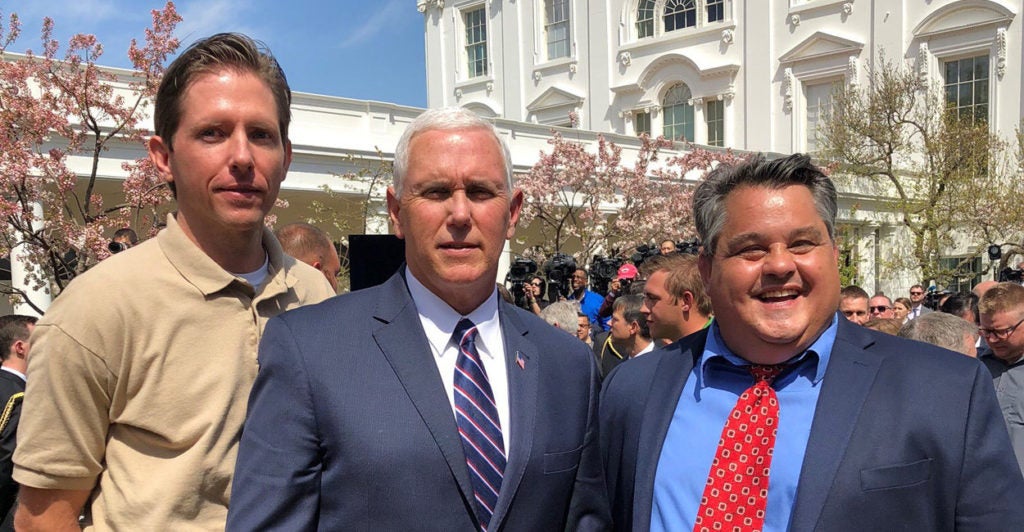Trump's Big Tax Cut: A Waste of Time or a Big Economic Growth Driver?
And have all Americans benefited?
The American economy has had a strong year. How much of this can we attribute to the federal tax reform passed in 2017? Ahead of this Sunday’s second anniversary of the Tax Cuts and Jobs Act, The Daily Signal is featuring several interviews about the law and its impact. We begin with Joseph Semprevivo, founder and CEO of Joseph’s Lite Cookies. The Daily Signal previously told his story and he’s back to explain how tax cuts not only benefited his cookie business but also Americans as a whole.
We round out today’s show with six individuals who spoke to The Daily Signal exclusively at the U.S. Treasury Department this week. They include economist Stephen Moore, a visiting fellow at The Heritage Foundation; Michael Faulkender, assistant secretary of economic policy at the U.S. Treasury Department; Christopher Netrum, vice president of tax and domestic economic policy at the National Association of Manufacturers; Ken Bentsen, president and CEO of the Securities Industry and Financial Markets Association; John Kartch, vice president of communications for Americans for Tax Reform; and Adam Michel, a senior policy analyst at The Heritage Foundation.
Rachel del Guidice: We’re joined on The Daily Signal Podcast today by Joseph Semprevivo, who is the founder and CEO of Joseph’s Lite Cookies. Joseph, thank you so much for being with us today.
Joseph Semprevivo: Thank you so much for having me. It’s been a very interesting journey in my lifetime. The cookie company was started when I was a little boy diagnosed with diabetes at the age of 9. And at that time, my mom and dad had a restaurant and they went away on their very first vacation, we came back, and the restaurant was empty. The manager stole everything they had. They went bankrupt and here I am, a little diabetic boy, watched my parents struggle, lose everything.
At this time I’m about 11 and a half years old and I decided one day I wanted to make a difference. …
My dad was a cook, my mom was a waitress at the Holiday Inn, and they decided to open up another restaurant and they were talking to me and my dad said, “I want to make an ice cream and serve it to everybody.” And I said, “Geez, I want to make a sugar-free one,” so I went to make a sugar-free ice cream.
I’m selling it to 197 stores. And then one day after freezers broke down at a store and we had to throw everything away, I asked my parents, “Could you make me a cookie?” And they did. And I fell in love with it. It was the first sugar-free cookie I had since I was diagnosed.
I’m now 15 years old and [watched] my parents skip meals. … I remember very vividly, we would sit down for dinner and my mom and dad would never eat and I would say, “Mommy, daddy, why aren’t you eating with me?” They’re with us—my brother and sister and I—and, “Oh, I ate when I was cooking.” And that was all because they didn’t have enough money to pay for my insulin.
So they had to skip meals, save on food costs, so they could pay for my medicine being I was a diabetic. That’s always stuck in my head very vividly.
So then I jumped in and we were making cookies and I’ve been doing that now for 33 years and sugar-free pancake syrup and all these other products that we’re getting to share this product across the world.

del Guidice: That’s really incredible. Thank you so much for sharing that story. So you mentioned that your business is more than cookies. You mentioned the pancake syrup. Are there any other products that your company makes? And also, how big is your company? How many folks do you have working there?
Semprevivo: Total company, we have seven people that work for the company.
del Guidice: Wow. And you do so much with a … pretty lean staff.
So, you’re no stranger to The Daily Signal. We’ve actually covered your small business and how you supported Republicans’ tax reform package that went into effect in January of 2018. And that tax package, for people who might be a little rusty on everything that it did, a few things it did was reduce the federal corporate tax rate from 31%, 35% to 21%. It also repealed the corporate alternative minimum tax.
So two years down the road, Joseph, looking at what your life and your business climate was like before tax reform to now two years later, how would you say tax reform has impacted your business?
Semprevivo: It’s given us more freedom more so than anything—the cash that was freed up rather than sending money to Washington, D.C., and having to budget for that money every single year. I look at it as if you have a dollar and you added that dollar, you have to put away 30 cents every year in this bucket just so you could pay your taxes 12 months later. That’s money being taken right out of the economy.
What these tax cuts allowed us to do was to put that money to work, invest back into equipment, invest back into our team members. We expanded our syrup company. We had a total of seven employees.
We expanded our syrup company. We only had one person in the syrup company. We now have 11 in the syrup company. We opened up another business, a real estate brokerage firm from the free funds that were released. We hired 16 people in that company. I just created another product line that is not related to food and that gets launched in 2020. Created another small business. We’ll have about three employees, three to five employees there.
So this has just completely given us freedom to expand, to hire more people, more middle-class taxpayers and upper-middle-class taxpayers. They’ll earn great wages and they’ll work hard and contribute to society and the economy.
del Guidice: Well, that’s incredible. Looking at what happened with tax reform, are there any specific elements to the package that you say were specifically effective? If there was one or two things you could pull out of everything that happened, is there one thing where you’re like, “This was the most helpful to us”?
Semprevivo: To me it was more of a simplification of the tax code. And I know in everything that you read out there, people are saying it’s more complicated. It’s actually simpler to do our taxes this year.
And there was a specific section, Section 199A, where in pass-through companies, which is 60 million … We figured what? 30.2 million small businesses that employ almost 60 million people in the country. They’re pastors. They get to take advantage of 199A, which means there’s 20% …
I like to look at it this way: 20 cents on the dollar of qualified income is freed up. Twenty cents on the dollar. So that business gets to employee 20 cents on the dollar toward a marketing to hire new people to give new raises. Small businesses struggle to keep people. So guess what? We’re throwing money at our team members to keep them. We can’t afford to lose them. So their wages are going up pretty aggressively, whether that’s through bonuses and raises and higher starting pay. It’s really a beautiful thing what’s been happening.
So the total of the package is wonderful. I like 199A because it freed up 20 cents on the dollar for small business owners in the United States. So that’s what I love about it.
del Guidice: So last July, I think that was when we last spoke for reporting I was doing on tax reform, you had specifically mentioned that you were able to hire five additional employees, you gave raises to your employees, and you were able to expand overall production. How did your employees react to those raises? Are there any specific stories that you can pull out? Remembering what happened and how they reacted to be able to get a pay raise maybe for the first time in awhile?
Semprevivo: Oh, absolutely. So I went to Mike, one of our team members for a long time, and I said, “Here’s your raise.” And the raises were between $3,000 and $5,000, and I’m just rounding down and up, but between $3,000 to $5,000. It depended on years of service and everything else. That was per year, and it’s ongoing still today.
Mike has two little babies, two little girls, and his car was getting a little beat up and getting miles, not as dependable. He went out because of the raise and bought a car for his wife to drive, so he knew his three girls, his wife and two babies, were safe. And this car was made in Michigan.

